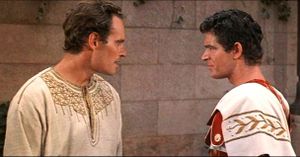Contents |
Genre Characteristics
 Judah Ben-Hur (Charlton Heston) and Messala
(Stephen Boyd) in the film adaptation of Ben-Hur (1959). Heston is the actor most
frequently associated with epic films, having
appeared in dozens over the course of his
career.
Judah Ben-Hur (Charlton Heston) and Messala
(Stephen Boyd) in the film adaptation of Ben-Hur (1959). Heston is the actor most
frequently associated with epic films, having
appeared in dozens over the course of his
career.
Generally speaking, the term "epic" refers to movies that have a large scope, often taking place during time of war or other conflict, that take place over a considerable period of time and/or place. A historical setting is commonplace, though fantasy/science fiction settings are also common. Usually they consist of a set goal or journey ("quest") that the characters are trying to achieve over the course of the film. A large cast of characters - though not always an ensemble cast - is also prevalent. By this definition, numerous animated films would also fall under this category, The Lion King and Finding Nemo being two of the most prominent examples.
The genre arguably reached its zenith in the '50s and '60s when Hollywood frequently collaborated with foreign film studios (namely Rome's Cinecittą) to use relatively exotic locations in Spain, Morocco, and elsewhere for the production of epic films. This boom period of international co-productions is generally considered to have ended with Cleopatra (1963). Although "epic" films continue to be produced to this day, they are typically not done on so grand a scale as films from this period.
The definition of epic has been broadened over the years to include films that in general have a large scale or scope of history, time, or events, even when not venturing out to epic adventures. The crime films The Godfather (1972), Once Upon A Time In America (1984), and Casino (1995), for instance, could hardly be considered epics in the same way that the Cinecitta films were, but are usually listed as such by most critics.
Many mistakenly refer to any film that is "long" (over two hours) as an epic, and as such a definition of an epic film (especially among today's films) is a matter of dispute among many. As Roger Ebert put it, in his Great Movies article on Lawrence of Arabia:
"The word epic in recent years has become synonymous with big budget B picture. What you realize watching Lawrence of Arabia is that the word epic refers not to the cost or the elaborate production, but to the size of the ideas and vision. Werner Herzog's Aguirre: The Wrath of God didn't cost as much as the catering in Pearl Harbor, but it is an epic, and Pearl Harbor is not." Link
Epic films were recognized in a montage at the 2006 Academy Awards.
People associated with epics
Some of the most famous directors of epics include David Lean, Sergio Leone, John Ford, William Wyler, George Lucas, Steven Spielberg, Werner Herzog, Cecil B. DeMille, and D.W. Griffith, all of whom essentially made careers out of films that could be considered epics. The actor most commonly associated with epic films is Charlton Heston.
Categories: Film genres




 216.73.216.133
216.73.216.133 User Stats:
User Stats:
 Today: 0
Today: 0 Yesterday: 0
Yesterday: 0 This Month: 0
This Month: 0 This Year: 0
This Year: 0 Total Users: 117
Total Users: 117 New Members:
New Members:
 216.73.xxx.xxx
216.73.xxx.xxx
 Server Time:
Server Time: